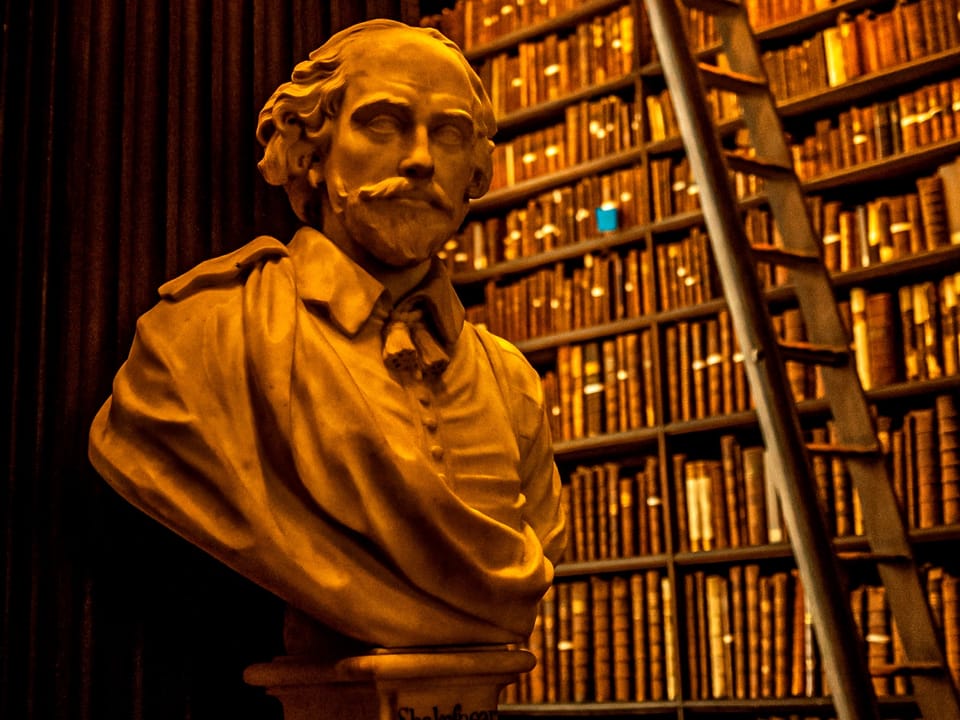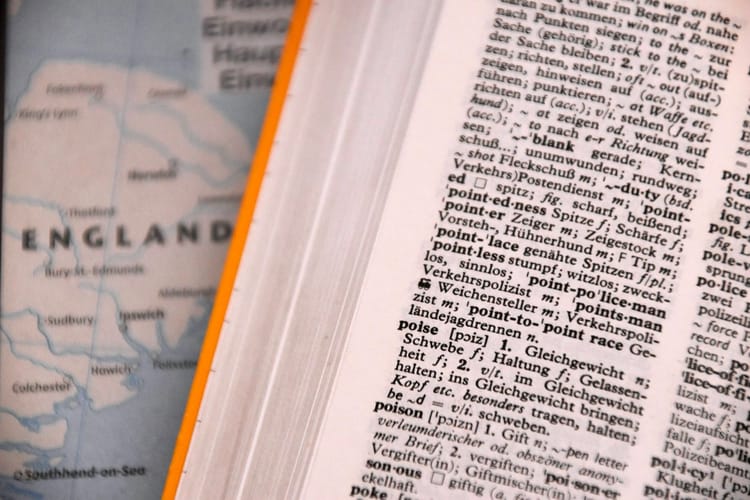Dumb History of Shakespeare

You might find it hard to believe but there was a time when people actually paid to watch Shakespearean plays. Back in the days before YouTube, they gathered in grand auditoriums, straining to hear what the performers were saying. Even if they were able to hear, they hardly understood them. These plays were written in a Shakespearian script that only Shakespeare would understand. To make things worse, they did not even come with subtitles. Perhaps, that was severe. Let me amend that.
It was not uncommon for people to understand his plays, fueled by the notion that speaking in this manner makes one sound like an intellect. Verily, those who doth converse in the tongue of Shakespeare art deemed wise.
*writer smugs in silence*
Many people believe that Shakespeare died on his birthday. This cannot be farther from the truth. He actually died 52 years after he was born. So, he had enough time to finish his plays. They were not written like that because he was in a hurry to finish them. That’s just how he writes.
However, one thing is for certain. When Shakespeare was born on April 23, 1564, nobody expected him to die on the exact same day on April 23, 1616. It was a twist more dramatic than any he had written himself. Some say it was a cheeky reminder from the heavens that God is the ultimate playwright.
He was born in Stratford-upon-Avon. No, i’m not talking about God, I’m talking about Shakespeare. The name of his town was just as confusing as his plays. Shakespeare had a happy childhood. This is because he never had to learn Shakespeare in school.
What’s fascinating about his work is not what he wrote but how he wrote it. He wrote by dipping feathers into an ink bottle. It must be so frustrating to wet the feather after every two words. That could be why his prose sounds so incoherent. I am sure he skipped the vowels in frustration.
Let me be honest. I only read one of Shakespeare's plays because it was mandatory for my school exams. It was enough Shakespeare for me. I almost thought I’d read his entire collection while researching this article. But whom am I kidding? Nobody writes history by knowing everything. Sometimes we just have to wing it. Like, we say dinosaurs get emotional while watching friends through watching their bones. We have to say it. Then, one fine day, someone will believe it to be the truth. That is how truth is created.
Anyway, the second time I experienced Shakespeare was when my friend took me to a theater play called Macbeth. Two hours just flew past me. It was about a couple playing Game of Thrones. But here, there was only one throne. And then there were a few ghosts. None of the ghosts will scare you. They talk too much; that’s the only horror you will experience from them.
It seemed interesting at first. Not to me, but for a few people in the audience wearing old people costumes. I got distracted by a meme that my friend sent me and two hours just flew past me.
Moving on, Romeo and Juliet both die at the end. There you go! You need not read this play now, as I've already spoiled the ending for you. I've spared you three hours of misery, which would have felt like six hours.
Shakespeare, like me, was not particularly a fan of the English language. So he invented about 1700 words of his own in English. Puking, lackluster, and uncomfortable. Extreme words used to describe my blog. Dauntless, unreal, and swagger. Equally extreme words to describe my blog. All words invented just for me; and his plays.
Some people claim that Shakespeare is overly hyped. For instance, I invented more than 5000 words myself when I was in school. But they were called spelling mistakes. The only recognition I got was the zero that was awarded to me in my English exam. I should have been dauntless and stood my ground with my teachers. But unfortunately, I was only daunt.
The impact of Shakespeare is not confined to just theater. It is confined to both theater and school. He inspired many young children to become software engineers.
Picture this: a bright-eyed child, eager to explore the world of stories, is handed a copy of “Hamlet” or “Macbeth” by a well-meaning teacher, like a punishment from god. Little do they know, they are about to embark on a journey of confusion and existential despair.
"I'd rather learn to code in Python than decode this Shakespearean syntax," the child conceded. Mission accomplished: we manufactured another engineer.
Shakespeare's resume would read something like this: Spearheaded a golden age for entertainment, guiding society away from grim spectacles like public executions and animal fighting, as well as mundane pastimes such as watching neighbors' chickens squabble over worms. He was instrumental in improving people’s attention span by shifting their attention from watching people dying painfully to watching painfully long dramas.
Shakespeare wrote comedies that aren’t very funny and tragedies that are kinda funny. And then he wrote The Tempest. I don’t even know which of the two genres that it would fall into.
The Tempest is the story about a book that is about 300 pages long. It has a plot that is all over the place and all over the 300 pages. There’s a father who can do magic tricks and a daughter who cannot. There is a shipwreck, some political stuff that went over my head, a drunk butler to serve some laughs, and a lot of wandering around on an island. Throw everything into a blender and hit “frappe”.
After that, Shakespeare turned off the blender and stopped writing. The tempest would have made some sense if I put my head into it (not the blender, the book I mean), but who has time for that? By the time I reached the third act, I was already rolling my eyes round and round.
“To read or not to read”, that was the question.
I did not read. What about you?




Comments ()